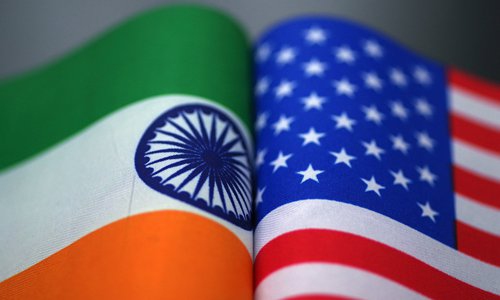
Photo: IC
The words on Quad solidarity from the Biden administration during the March video summit was still warm to India, but India only found itself alarmed by the US USS John Paul Jones's assertion of navigational rights and freedoms on April 7 inside its Exclusive Economic Zone (EEZ) without requesting its prior consent. Despite the humiliation, the Indian Ministry of External Affairs only conveyed its concerns to the US two days later over the incident, which observers deemed as unsubstantial.
This has angered nationalistic sentiment toward US imperialism among the Indian public and some criticized the Indian government's weakness in the face of a superpower, and others questioned the necessity of India to take part in the US-led Quad grouping. The US Navy's intrusion into India's EEZ, as the Indian media called, will strengthen India's strategic doubt toward the US and make it believe that its firm refusal to let Quad evolve into a NATO-like military alliance in Asia is a wise choice.
But this runs contrary to US perception. With all its preferential policies on Indian demands, the US believes itself having been consistently frustrated by India's reluctance to systemize the mechanism of Quad as a military group and turn it as the kernel of a larger Asia-Pacific alliance like NATO. Considering India's planned acquisition of Russia's S-400 defense system, the US moves can be seen as its attempt to warn and pressure the Modi administration. India does not want to completely lean toward the US but tries to seek gains from both the US and Russia, which will inevitably affect the US attitude toward its military cooperation with India.
To put it simple, India is not willing to accept a secondary role in US-India relations, but the US will not allow India to sit with it on an equal footing. If Quad is systemized and develops as mini-NATO, it means India can hardly retract its formal commitments to the US as requested in an alliance. India does not want to be attached to the US chariot, because this will deal a heavy blow to India-Russia relations. Russia has many cards to play - if it develops relations with Pakistan, India will face more challenges in the South Asian subcontinent, not to mention the fact that deteriorating India-Russia ties will give it less maneuvering space in major power politics.
The Biden administration sees it a right move to exert pressures on India when his immediate predecessor Donald Trump catered to India's demands in order to push forward strategic cooperation between India and the US and bring India into the orbit of Quad. The Biden administration trusts that it has done enough to privilege Indian status on its political agenda when it plays down domestic concerns on the Modi government's human rights records on minority rights and unfair trading practices against US companies, which will zoom large in the coming season for the next midterm congressional elections.
So far, military cooperation between the US and India has past its periodic peak and bilateral relations face pressure in the foreseeable future. The political disharmony between the US and India is expected to intensify. For India, its center of foreign policy is never the US. India will not give up other opportunities for the sake of the US, especially the chance of claiming hegemony in the Indian Ocean.
This also demonstrates that Quad has reached its ceiling and internal contradictions are expected to emerge. The latest US move toward India is indicative. India is the key factor in Quad - Australia and Japan are already US allies, and India is not, which gives it a unique position to claim privileges. The US "intrusion" of India's EEZ as a means to give notice to India highlights the dilemma of the Quad grouping to become systemized. The lesson for Australia and Japan is that there is no such thing as a free lunch - if they want to keep receiving strategic support from the US, they must return with what the US wants, or no matter how important a partner is, the US will not be hesitant to wave its big stick.
After all, the biggest dilemma of Quad is that the four members did not reach a consensus on their common threat. The four keep an alert on China's rise, but attach economic importance to it - Australia and Japan believe the Chinese market is important to them, India relies on Chinese supplies, and the US takes both the Chinese market and supplies seriously. The Biden administration has made clear that there will be "extreme competition" with China, but it would also seek areas of cooperation. When the leading country of the grouping stresses cooperation, the choice for the other three couldn't be clearer.
The author is an assistant professor at the Institute for International and Area Studies, Tsinghua University. opinion@globaltimes.com.cn




